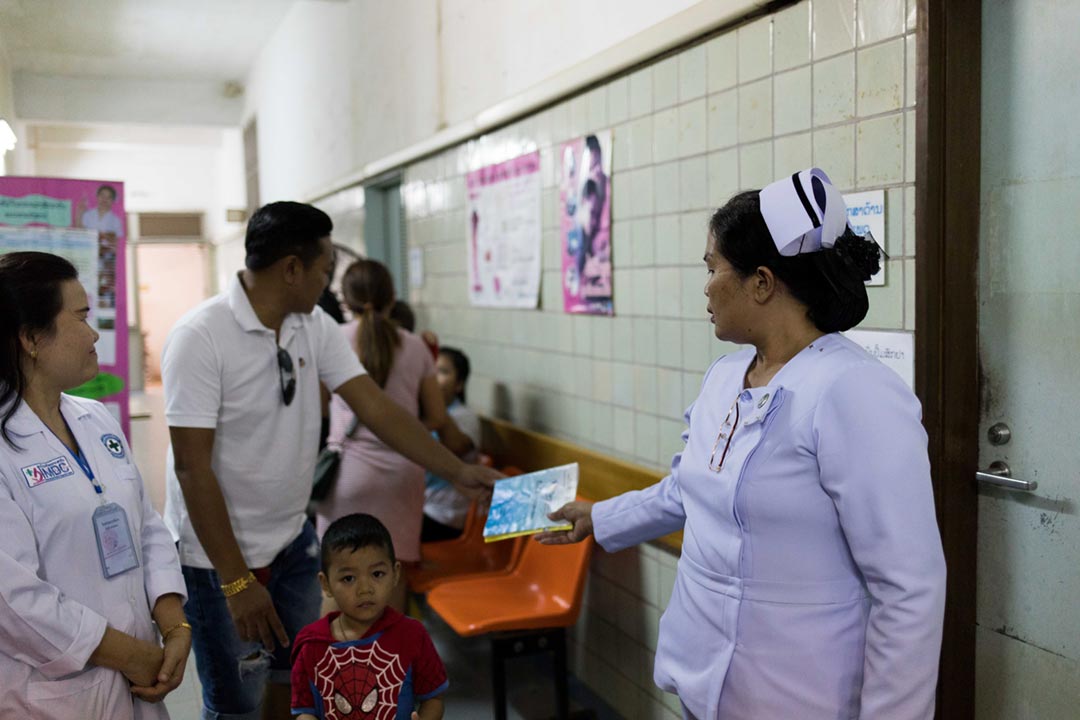A decade of partnership turns COVID-19 vaccination challenges into long term local solution in Laos
A long-standing partnership in Laos helped overcome challenges during COVID-19 vaccine introduction and led to long-term solutions that continue to support health workers with routine immunisation.
- 26 June 2023
- 5 min read
- by Dr Dung Tham Chi

Nearly a decade ago, the Government of Laos introduced Japanese encephalitis (JE) vaccine into the country, with support from Gavi, the Vaccine Alliance. After an initial provincial roll-out in 2013, and a transition to routine immunisation in 2015, JE vaccine is now available nationwide.
Often called "brain fever," JE is a devastating disease that kills up to 30% of those who fall sick, mostly children. In Laos, nearly three million children have been protected from JE since 2013. PATH has worked with the Ministry of Health in Laos for more than a decade, providing technical assistance and troubleshooting solutions as challenges arose.
As Laos grappled with the impact of the COVID-19 pandemic, PATH drew upon existing JE project resources, as well as networks and connections built over a decade of JE vaccine work, to strengthen the immunisation system at a time when most routine immunisation work stalled.
Despite initial momentum and high vaccine coverage, uptake of JE vaccine severely declined between 2018 and 2021 due to vaccine unavailability and limited resources for scale-up. PATH supported the Ministry of Health to focus on areas where demand for JE vaccine was low, and to put concerted effort toward reaching specific communities with low vaccine uptake and in hard-to-reach areas.
From the beginning of the partnership with the Laos government, PATH worked to support the needs and requests of local stakeholders, gaining trust as a local partner, and becoming integral to the government"s response when routine immunisation activities and outreach halted at the onset of the COVID-19 pandemic.
COVID-19 called on all partners to work
As Laos grappled with the impact of the COVID-19 pandemic, PATH drew upon existing JE project resources, as well as networks and connections built over a decade of JE vaccine work, to strengthen the immunisation system at a time when most routine immunisation work stalled.
Several long-standing immunisation system gaps needed urgent attention and resources to ensure COVID-19 vaccines reached all communities efficiently. While the Government of Laos prioritised many COVID-19 response activities, partners, including PATH, filled the gaps for other crucial activities.
As a long-time partner, PATH was intimately familiar with the local challenges to maintain stock of routine immunisation vaccines. Historically, when vaccine supply did not keep up with demand, local communities could not receive their vaccines and lost trust in their local health system officials. Vaccine coverage often dropped.
Have you read?
Alternatively, with sustained, readily available vaccines, communities' increased trust in the health system led to higher vaccination coverage. During COVID-19 vaccination roll-out it was crucial to ensure vaccines were available in the communities, alongside well-trained health care workers, to foster more confidence in the health system, rather than sowing distrust and misinformation about a new adult vaccine.
A system built for COVID-19 vaccination with the long view
PATH immediately set to work on solutions to help ensure COVID-19 vaccines remained readily available in the community, together with health workers who could answer questions and provide information about the new vaccine. In direct partnership with the Government of Laos Ministry of Health, Department of Planning & Finance, University of Health Science, and support from the local telecon provider, PATH built an e-learning platform in local languages, with videos and subtitles, to bolster training for health workers about routine immunisation, including JE, COVID-19 vaccination, as well as stock management and communications.
Once tested and fully built, the e-learning platform, with four complete modules, rolled out at a central level, followed by cascade trainings within each province. By November 2022, all 18 provinces had received their training. Health workers have 24/7 access to the platform to receive information, access support and connect with centralised information. Health workers are also supported with tools for real-time data reporting to improve data accuracy.
Not only a "COVID-19 solution": a system solution
In late 2022, PATH fully handed over the e-learning platform to the Government of Laos. The telecon system is fully supported locally and is under the control of the National Immunization Programme. PATH's technology support team in Hanoi, Vietnam provided technical assistance as needed. The government of Laos expanded the e-learning beyond COVID-19 and JE vaccines so that health workers have access to routine immunisation information when they need it.
As the world works to reach children who missed routine childhood immunisation in the early days of the pandemic, local ownership of the e-learning platform is a timely model. Health workers feel supported, the supply of routine immunisation is more effectively managed, with the happy result that vaccines and accurate information are available to the local communities, maintaining their trust in the health system.
With a bit of foresight, and deep trust between the Government of Laos and PATH, the e-learning platform, a byproduct of urgent need during the COVID-19 pandemic, is a long-term sustainable solution that tackles a long-standing challenge. The system is now a permanent tool that continues to benefit immunisation staff, allowing them to receive training remotely, a crucial benefit for staff in rural and remote areas that have historically struggled with access to quality immunisation training.
The Government of Laos can use the system to train HCWs across antigens, to plan for outbreaks and future pandemics, and to ensure that the locally owned system continues to meet the local demand, thereby building trust, increasing vaccine coverage, and working to ensure that children remain protected from JE and other childhood illnesses.





